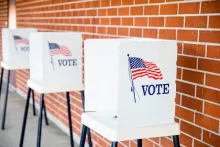Let’s read that again; the “Stalkers Empowerment Act.” Who in their right mind would want to empower a stalker? I’ll give you one guess . . .
This Fri., Feb. 7, the House Criminal Justice and Public Safety Committee will hold a hearing on HB700, relative to orders of protection. This bill will make dangerous and unnecessary changes to New Hampshire's Stalking Statute, RSA 633:3-a. The “Stalkers’ Empowerment Act” will make it harder for the courts to remove deadly weapons from dangerous stalkers. It also adds language to NH’s stalking law that questions the credibility of victims. What could possibly go wrong?
Legislators need to prioritize policies that protect the public, not ones that make it easier for stalkers to terrorize and kill their victims.
Nationally, 1 in 3 women and 1 in 6 men are stalked during their lifetimes, the majority of victims experience physical threats to their safety. In NH, hundreds of stalking victims access vital services every year through 12 community-based crisis centers in the state.
Stalking victims already face enough barriers to seeking relief and protection through the courts. Nearly all victims in NH are self-represented in protective order cases and may not know how to navigate the judicial process. Barriers to protection should be removed, not increased.
HB700 creates additional challenges for victims by sending the message that they somehow shouldn't be believed at a time when they may already fear retaliation from their abuser for coming forward. All forms of stalking are dangerous and traumatizing.
- Additionally, this bill makes the assumption that victims who are stalked by a neighbor or stranger are in less danger.
- 1 in 5 stalkers use a deadly weapon to threaten their victim, and perpetrators use various tactics to stalk their victims, often changing their strategies in response to new restrictions such as protective orders.
- Many stalkers also target people known to the victim, placing family, friends, coworkers, and community members at risk of violence.
This bill ties the hands of judges to keep victims safe. Under current law, judges have discretion when granting the removal of firearms and deadly weapons. This bill significantly raises the standard for how judges can make that determination, limiting their ability to adequately protect victims and grant life-saving relief.
Stalkers should not be empowered; legislators should not help to enable them; victims need to be protected.
To register your opposition to HB 700, follow the instructions below. Be sure to register your opposition before the hearing on Friday!
Use this link and follow these simple steps:
1. Click February 7 on the calendar.
2. Select "House Criminal Justice and Public Safety" in the committee drop-down list.
3. Choose 11:30am - HB700 from the "bill" drop-down list.
4. Select "Member of the Public" under the "I am" drop-down list.
5. Type "Myself" in the "I am representing" section.
6. Finally, select "I oppose this bill" and then click "continue." This will lead you to a page where you can complete the registration process, (name, address, etc.)
Thank you for taking a few moments to speak up in defense of stalking victims.










